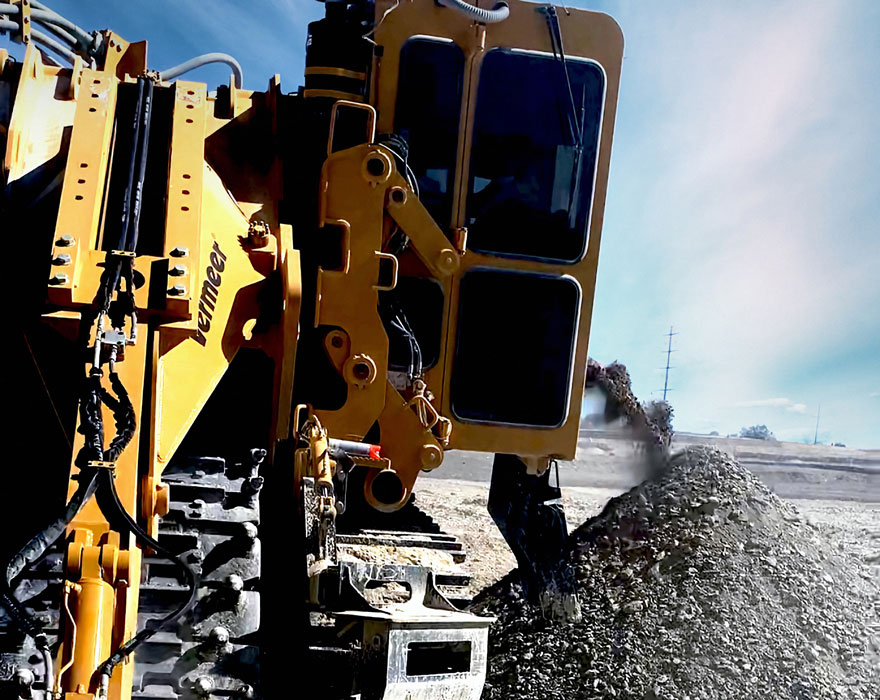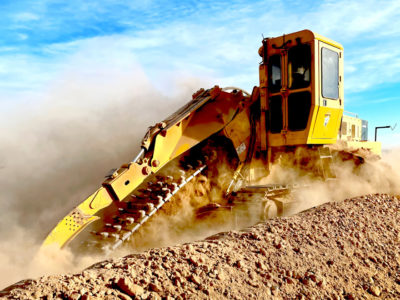Texas is known for its challenging ground conditions. There are more than 1,300 different kinds of soil recognized in the state, but the condition contractors dread the most is rock. Limestone, shale, chalk, mudstone, sandstone, marl, conglomerate, paleosols — Texas has all of these sediment and rock types, and all can contribute to slow production.
But it doesn’t have to be that way. A couple of Texas contractors doing different applications of work have found adding a Vermeer trencher to their fleet has kept them ahead of schedule and on budget.
R & N Trenching builds business with Vermeer trenchers
Over 12 years ago, Richard Bauman and his wife, Nola, established R & N Trenching Inc. in West Texas, a specialized trenching business supporting Texas’ massive network of pipelines. “At the time, there were a few companies around Mertzon, Texas, where we’re based, running big trenchers from time to time. But many of them tried to do as much as they could with excavators,” said Bauman. “It didn’t make much sense. I had a hard time understanding why companies didn’t invest in adding a Vermeer trencher to their fleet. So, we launched a business offering trencher service.”
It didn’t take long before Bauman’s phone was ringing. A friend doing pipeline construction reached out even before the Baumans had a chance to acquire their first trencher. “I contacted the Vermeer dealer in Midland, Texas, and leased a Vermeer T1055 Commander® 3 trencher,” explained Bauman. “After three months of working that machine, the business was already going so well; I converted the lease into a purchase. Since then, we’ve expanded our fleet of trenchers, and now have two T955III and three T1055III trencher units.”
Vermeer trencher advantage
When pipeline companies struggle to dig ditches in the area, R & N Trenching gets the call. And, unlike typical companies using excavators, the Baumans don’t need to send a large crew of people and equipment out to do the job. Instead, it’s one Vermeer trencher, one operator and a support person or two to assist where needed.
“When we show up with a Vermeer trencher, everyone else on the job has to be on top of their game to keep up,” Bauman said. “In conditions where the dirt sheds off the chain easily, we cut between 3,000 ft to 5,000 ft (914.4 m to 1,524 m) a day. It would take three to four excavators going hard from sunup to sundown to open up that much ditch. Plus, they would have many more people out there doing the work.”
In harder rock, production output slows a bit, but Bauman says this is where Vermeer trenchers really excel over excavators. “We’ve shown up on a lot of jobs where other companies have brought in pairs of excavators working together in rock,” he explained. “One has a breaker on it and the other a bucket, and the two machines fight the rock all day pulling out chunky material that’s not good for anything. Meanwhile, our operator and our Vermeer trencher are churning through rock steady, and nice packable material is piling in a straight line right next to the cut.”
Blue Star Utilities employs Vermeer trencher on infrastructure expansion projects
R & N Trenching isn’t the only Texas contractor to discover the advantage of operating a Vermeer trencher. Steve Hugdahl and Jose Guamancela own Blue Star Utilities LLC, based in Venus, Texas. Their team is putting their Vermeer T1155 Commander® 3 trencher to work in underground infrastructure expansion projects. Hugdahl and Guamancela have been doing utility construction work together for 20 years, but up until 2016, it was for other companies. Now, they are building out the underground infrastructure for new housing subdivisions around the Dallas-Fort Worth metroplex.
Blue Star Utilities is the first company working on-site for planned housing developments. “We build out water, sewer and storm drainage systems and tie them into existing infrastructure,” explained Hugdahl. “To most people, using a huge track trencher for this type of work might seem out of place, but when we’re working around Fort Worth and Anna, Texas, the rocky ground conditions can be a big challenge for big excavators.”

Upgrading to a Vermeer trencher
When the team at Blue Star Utilities found themselves in rocky conditions for the first couple of years of operations, they did what they could with excavators or rented a trencher from the Vermeer dealership in Irving, Texas. Over the years, they realized they were more frequently renting trenchers, so they made the decision to purchase a Vermeer T1155III trencher in January 2022.
“As our work took us further north, the rock we were digging in got harder,” said Hugdahl. “On top of that, we won bids on four sizable subdivisions, and we knew we had to make sure all our crews could work as quickly and efficiently as possible. Employing a Vermeer trencher was the key to making that happen.”
Time efficiency
Hugdahl said the company was able to knock 60 days off the project timeline the first time they put the T1155III trencher to work.
“We understand the financial strain our development companies are working from. A lot of work needs to be done before the first property can be sold and profit starts to roll in. During that time, they are just writing out checks and paying interest to the bank. So, if we can get the first phase of the project done faster than someone else, it makes their decision about which company to go with much easier.”
Extended job timelines don’t just stretch out developers’ costs, either. Extra days and extra machines translate into additional labor, higher fuel costs and longer wait times between payments if you’re a contractor. “Everyone benefits when the work can be done in less time,” Hugdahl said.
More possibilities
Before bidding on new projects, Hugdahl always looks over engineering geotech reports to determine when they can get by with excavators and when using their trencher makes the most sense. “Both Jose and I have spent too many years working around contractors who didn’t finish work when they said they would, and that’s not who we want to be. Having the T1155III trencher in our equipment fleet means we’re prepared for almost anything the area’s unforgiving ground conditions can throw our way,” Hugdahl explained.
Formula for success
Investing in Vermeer trenchers has helped R & N Trenching and Blue Star Utilities build solid reputations with the companies they do business with, instead of grinding it out with contractors trying to get by with excavators alone. And, with the tight labor market contractors face, these two companies are accomplishing more with fewer people. That is the advantage of investing in a Vermeer trencher when doing underground construction work in Texas.
If you want to learn more about how a Vermeer trencher can help you stay productive on your next underground installation job, contact a Vermeer dealer.
This article contains third-party observations, advice or experiences that do not necessarily reflect the opinions of Vermeer Corporation, its affiliates or its dealers. Testimonials and/or endorsements by contractors in specific circumstances may not be representative of normal circumstances experienced by all customers.
Vermeer Corporation reserves the right to make changes in engineering, design and specifications; add improvements; or discontinue manufacturing at any time without notice or obligation. Equipment shown is for illustrative purposes only and may display optional accessories or components specific to their global region. Please contact your local Vermeer dealer for more information on machine specifications.
Vermeer, the Vermeer logo and Commander are trademarks of Vermeer Manufacturing Company in the U.S. and/or other countries. © 2022 Vermeer Corporation. All Rights Reserved.
